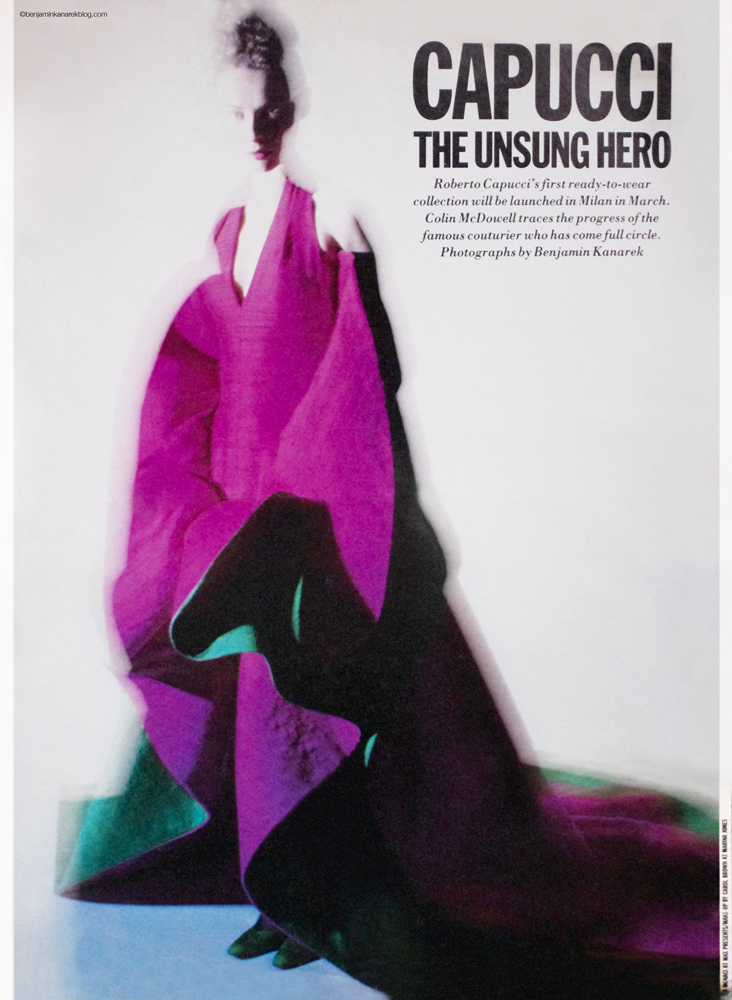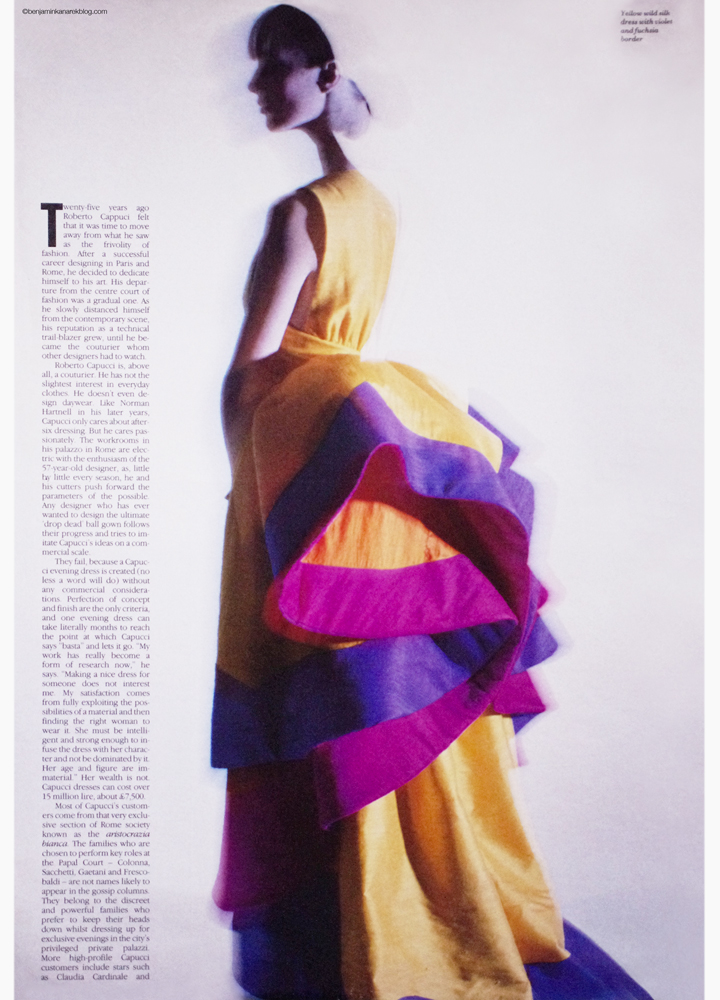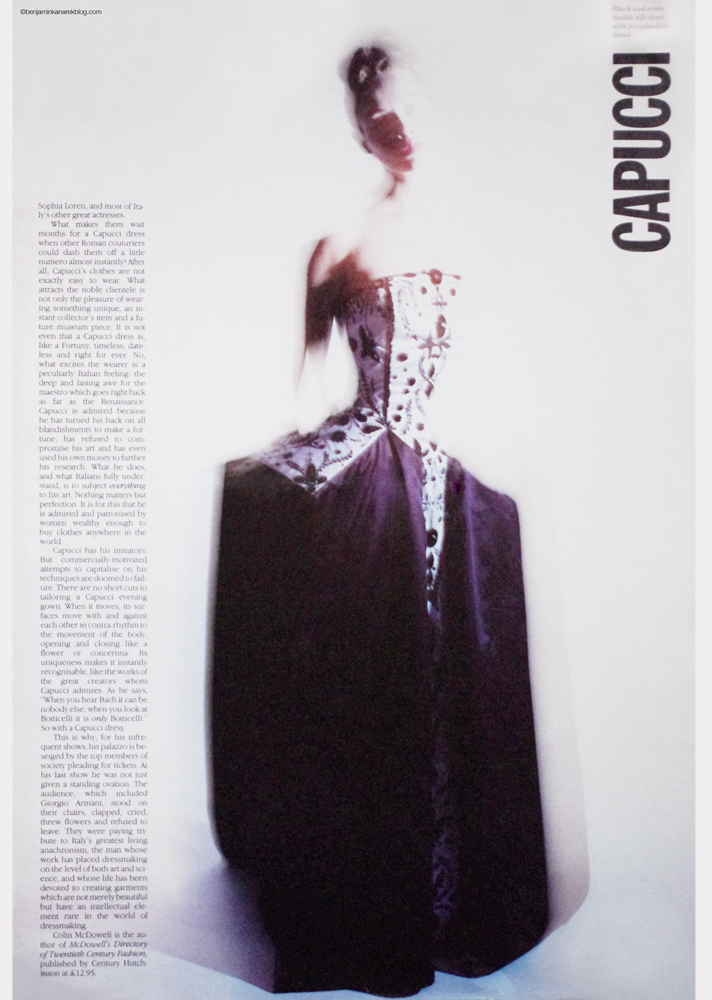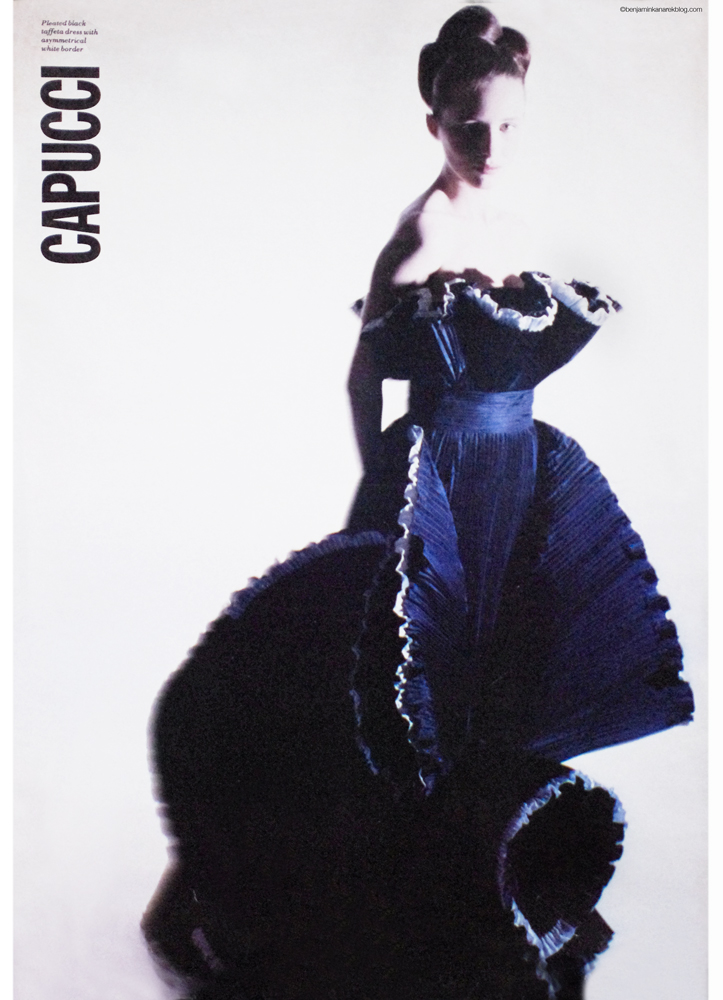Benjamin Kanarek was priviledged to photograph the creations of one of the masters of Italian Couturiers, Roberto Cappucci for “W” Magazine Europe in 1990.
25 years ago Roberto Capucci felt is was time to move away form what he saw as the frivolity of fashion. After a successful career designing in Paris and Rome, he decided to dedicate himself to his art. His departure form the centre court of fashion was a gradual one. As he slowly distanced himself from the contemporary scene, his reputation as a technical trail-blazer grew, until he became the couturier whom other designers had to watch.
Roberto Capucci is above all, a couturier. He has not the slightest interest in everyday clothes. He doesn’t even design daywear. Like Norman Hartnell in his later years, Capucci only cares about after six dressing But he cars passionately. The workrooms in his palazzo in Rome are electric with the enthusiasm of the 57-year-old designer, as little by little every sea on, he and his cutters push forward the parameters of the possible. Any designer who has ever wanted to design the ultimate “drop dead” ball gown follows their progress and tries to imitate Capucci’s ideas on a commercial scale.
They fail, because a Capucci evening dress is created (no less a word will do) without any commercial consideration Perfection of concept and finish are the only criteria, and one evening dress can take literally months to reach the point at which Capucci says “basra” and lets it go. “My work has really become a form of research now”, he says. “Making a nice dress for someone does not interest me. My satisfaction comes from fully exploiting the possibilities of a material and then finding the right woman to wear it. She must be intelligent and strong enough to indues the dress with her character and not be dominated by it. Her age and figure are immaterial”. Her wealth is not. Cappucci dresses can cost over 15 million lire, about £7,500.
Most of Capucci’s customers from that very exclusive section of Rome society known as the aristocrazia bianca. The families who are chosen to perform key roles at the Papal Court – Colonna, Sacchetti, Gaetani, Frescobaldi – are not names likely to appear in the gossip columns. They belong to the discreet and powerful families who prefer to keep their heads down whilst dressing up for exclusive evenings in the city’s privileged private palazzi. More high-profile Capucci customers include stars such as Claudia Cardinale and Sophia Loren, and most of Italy’s other great actresses.
What makes them wait months for a Capucci dress when other Roman couturiers could dash them off a little numero almost instantly? After all, Capucci’s clothes are not exactly easy to wear. What attracts the noble clientele is not only the pleasure of wearing something unique, an instant collector’s item and a future museum piece. It is not even that a Capucci dress is, like a Fortuy, timeless, dateless and right of ever. No what excites the wearer is a peculiarly Italian feeling the deep and lasting awe for the maestro which goes right back as far as the Renaissance.
Capucci is admired because he has turned his back on all blandishments to make a fortune, has refused to compromise his art and has even used his own money to further his research. What he does, and what Italians fully understand, is to subjects everything to his art. Nothing matters but perfection. It is for this that he is admired and patronized by women wealthy enough to buy clothes anywhere in the world.
Capucci has his imitators. But commercially motivated attempts to capitalize on his techniques are doomed to failure. There are no short cuts to tailoring a Capucci evening gown. When it moves, its surface move with and against each other in contra-rythm to the movement of the body, opening and closing like a flower or concertina. Its uniqueness makes it instantly recognizable, like the works of the great creators whom Capucci admires. As he says, “When you hear Bach it can be nobody else, when you look at Botticelli it is only Botticelli”. So with a Capucci dress.
This is why, for his infrequent shows, his palazzo is besieged by the top members of society pleading for tickets. At his last show he has not just given a standing ovation. The audience, which included Giorgio Armani, stood on their chairs, clapped, cried, threw flowers and refused to leave. They were paying tribute to Italy’s greatest living anachronism, the man whose work has placed dressmaking on the level of both art and science, and whose life has been devoted to creating garments which are not merely beautiful but have an intellectual element rare in the world of dressmaking.
Colin McDowell
The Team
Photography by Benjamin Kanarek
Make up by Carol Brown





